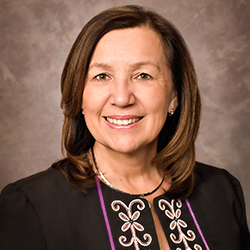Professor Marie Battiste is a Mi'kmaw educator from the Potlotek First Nation, Nova Scotia and full professor at the Department of Educational Foundations at the University of Saskatchewan. She is the founding academic director of the Aboriginal Education Research Centre (AERC) at the University of Saskatchewan, a founding board member of the Canadian Council on Learning, and a former co-director of the Aboriginal Learning Knowledge Centre. She currently heads a SSHRC-funded research hub called the Canadian Prevention Science Cluster, which aims to identify evidence-based research for violence prevention programs in schools. With degrees from Harvard and Stanford, she is widely acknowledged as a senior Indigenous scholar in Canada whose work in Aboriginal knowledge and teaching has opened up new areas of research.
In 2008, she was awarded the National Aboriginal Achievement Award in Education for helping to spur institutional change in order to decolonize education, activate social justice and promote postcolonial approaches to education that recognize and affirm the political and cultural diversity of Canada. Her most recent book Decolonizing Education Nourishing the Learning Spirit, 2013 follows her Sask Book Award for Protecting Indigenous Knowledge and Heritage: A Global Challenge, co-authored with J. Youngblood Henderson. She is editor of Reclaiming Indigenous Voice and Vision and senior editor of First Nations Education in Canada: The Circle Unfolds. She received the Distinguished Academic Award from the Canadian Association of University Teachers in 2013 and was the first woman to receive the Distinguished Researcher Award from the University of Saskatchewan. She has three honorary degrees to her credit (St. Mary’s, University of Maine at Farmington, and Thompson Rivers University), and was elected to the Royal Society of Canada in 2014.
Professor Battiste’s ideas on the key role of post-colonial education in developing Aboriginal communities have made her a model for members of these communities, a symbol of Canadian diversity, and an inspiration to educators everywhere.
